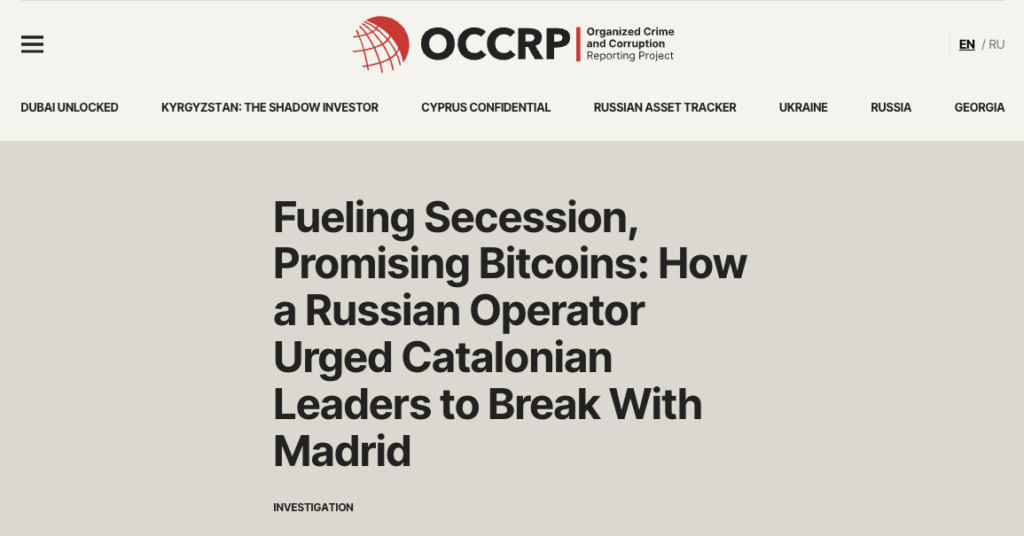05.12.2024 - 11:14
|
Actualització: 05.12.2024 - 11:17
The international consortium of media outlets and journalists through which El Periódico de Catalunya disseminated information about an alleged Russian plot linked to the Catalan independence process is a tool of the United States government to exert political influence worldwide.
This is the conclusion of an investigation conducted by several media outlets, including Mediapart (France), Drop Site News (USA), Il Fatto Quotidiano (Italy), and Reporters United (Greece), in collaboration with the German public radio network NDR, which ultimately withdrew from publishing the revelations due to pressure, despite having led the investigation.
The findings indicate that this consortium, the Organized Crime and Corruption Reporting Project (OCCRP), which brings together dozens of media outlets worldwide to publish investigative reports on major corruption cases, receives half its funding from U.S. government agencies. Washington has the power to veto appointments to its leadership team and imposes silence on investigations into potential corruption scandals that implicate U.S. agencies, multinational corporations, or compromise U.S. diplomatic and strategic interests.
Among the seventy media outlets associated with OCCRP is El Periódico de Catalunya, which, under this umbrella, published a report in May 2022 on contacts between alleged representatives of the Russian government and individuals close to President Carles Puigdemont in the fall of 2017. The report suggested Russia offered support for Catalan independence to destabilize the Spanish state, including offers of money and 10,000 armed soldiers in exchange for favorable cryptocurrency legislation.
The Media-Judicial Plot
The journalists who produced that report relied on data extracted from the phones of Víctor Terradellas, a former CDC official investigated since 2018 by Judge Joaquín Aguirre of Barcelona’s Court No. 1 in a case initially concerning alleged embezzlement of public funds. Both sides collaborated in what attorney Gonzalo Boye, one of those implicated in the Russian plot case, described as a media-judicial conspiracy. Boye mapped out how information from Terradellas’s phones, exclusively used in the report, circulated.
The phone data had been in Judge Aguirre’s hands since 2018 due to the embezzlement case. In 2019, following a Civil Guard report referencing cryptocurrency use and alleged visits by Russian emissaries, Aguirre opened a separate case, known as the Vólkhov case. Progress stalled until January 2020, when Aguirre claimed to have received an anonymous letter linking a group of Russian businessmen “with strong economic interests in Catalonia” to support for independence.
Boye submitted a document to the court—reviewed by VilaWeb—showing that in March 2021, copies of Terradellas’s devices were made while in the possession of the judge and the Civil Guard. This data ended up in the international journalism consortium, which published its findings on May 8, 2022. These materials coincided with documents Aguirre said had been received in anonymous letters sent to the court.
In essence, the consortium used information under Aguirre’s custody to construct the narrative of the Russian plot. This narrative, presented as a report under the consortium’s umbrella, provided the judge with a pretext to reactivate a high treason investigation that had stalled amid negotiations for the amnesty law.
Who Funds OCCRP?
The investigation into OCCRP’s funding has now exposed Washington’s influence. The consortium was created in 2004 in Sarajevo by U.S. military and senior official David Hodgkinson, who is currently a member of U.S. intelligence services. The project was initially funded by the United States Agency for International Development (USAID). The first payment of $1.7 million was made in May 2008, with additional funding from the International Narcotics and Law Enforcement Affairs (INL) Office.
This raises credibility concerns for the consortium’s investigations, as explained in the report by former USAID official Mike Henning: “If the people providing you information think ‘oh, a cop,’ that might be a problem […]. Your independence and reputation are incredibly important.”
Since its inception, OCCRP has received at least $47 million from the U.S. government. It has also received $1.1 million from the European Union and $14 million from six European states: the United Kingdom, Sweden, Denmark, Switzerland, Slovakia, and France. Together, these contributions accounted for 70% of the consortium’s budget between 2014 and 2023, with U.S. funding alone making up 52% of the total.



